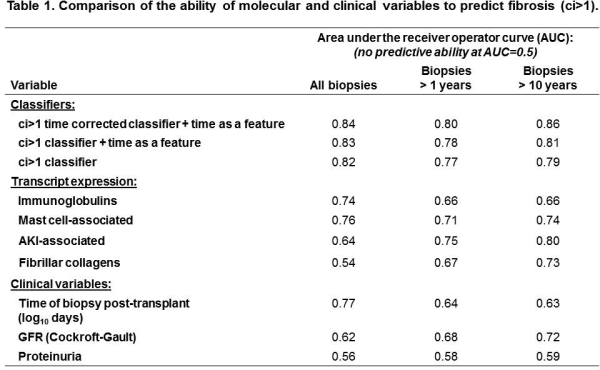Molecular Classifiers Accurately Measure the Degree of Fibrosis in Human Kidney Transplant Biopsies
University of Alberta, Edmonton, Canada.
Meeting: 2015 American Transplant Congress
Abstract number: B128
Keywords: Area-under-curve (AUC), Fibrosis, Renal dysfunction, Renal injury
Session Information
Session Name: Poster Session B: Kidney Complications: Late Graft Failure
Session Type: Poster Session
Date: Sunday, May 3, 2015
Session Time: 5:30pm-6:30pm
 Presentation Time: 5:30pm-6:30pm
Presentation Time: 5:30pm-6:30pm
Location: Exhibit Hall E
Irreversible injury in organ transplants is an important clinical parameter, and is estimated by histology as the observed “ci” lesion, but with considerable inter-observer variability (kappa values around 0.3). Thus it is desirable to be able to estimate the degree of irreversible damage by a molecular measurement.
We found no individual molecules reliably predicted the degree of fibrosis because all were induced in some kidneys with fibrosis, acute kidney injury or various disease states. We developed molecular classifiers to assess the degree of fibrosis based on machine learning. Because time from transplant to biopsy is closely related to the histologic ci score, we used three different classifier derivation methods: 1. ci alone; 2. ci time corrected; 3. and ci time corrected with time as a variable. All 3 classifiers gave similar results, identifying the earliest biopsies (<1yr) as having no fibrosis, and indicating the degree of fibrosis in many of the late biopsies (>10yr) (Figure 1). The ci classifiers were as accurate as a second pathologist for predicting the ci score assigned by the original pathologist, and were superior to the observed ci scores in predicting future graft loss in random forest analysis. The ci classifiers gave the highest area under the curve (AUC) values compared to a number of previously described clinical and molecular variables associated with fibrosis: e.g. immunoglobulin and mast cell transcripts, time of biopsy post-transplant, and GFR (Table 1). Of note, fibrillar collagen transcripts had poor ability to predict the degree of observed fibrosis.
Thus the best estimates of chronic, irreversible damage at all time points are molecular classifiers derived from training on the observed histologic fibrosis, both without and with time corrections.
To cite this abstract in AMA style:
Venner J, Reeve J, Halloran P. Molecular Classifiers Accurately Measure the Degree of Fibrosis in Human Kidney Transplant Biopsies [abstract]. Am J Transplant. 2015; 15 (suppl 3). https://atcmeetingabstracts.com/abstract/molecular-classifiers-accurately-measure-the-degree-of-fibrosis-in-human-kidney-transplant-biopsies/. Accessed March 3, 2026.« Back to 2015 American Transplant Congress
